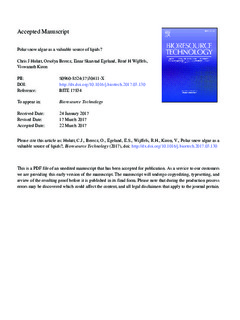Polar snow algae as a valuable source of lipids?
Hulatt, Christopher Jonathan; Berecz, Orsolya; Egeland, Einar Skarstad; Wijffels, Rene Hubertus; Kiron, Viswanath
Journal article, Peer reviewed
Accepted version

View/
Date
2017Metadata
Show full item recordCollections
Original version
Hulatt, C. J., Berecz, O., Egeland, E. S., Wijffels, R. H. & Kiron, V. (2017). Polar snow algae as a valuable source of lipids? Bioresource Technology, 235, 338-347. doi: 10.1016/j.biortech.2017.03.130Abstract
Microalgae offer excellent opportunities for producing food and fuel commodities, but in colder climates the low growth rates of many varieties may hamper production. In this work, extremophilic Arctic microalgae were tested to establish whether satisfactory growth and lipid production could be obtained at low water temperature. Five species of snow/soil algae originating from Svalbard (78–79°N) were cultivated at 6 °C, reaching high cell densities (maximum dry weight 3.4 g·L−1) in batch cultivations, and high productivity (maximum 0.63 g·L−1·d−1). After 20 days of cultivation total lipids ranged from 28% to 39% of the dry weight, and diverse patterns of neutral lipid (triacylglycerol; TAG) accumulation were observed. The five species largely accumulated unsaturated fatty acyl chains in neutral lipids, especially polyunsaturated C16 series fatty acids, C18:1n-9 and C18:3n-3. The results indicate that polar microalgae could provide an opportunity to increase the yields of microalgal biomass and oil products at low temperatures.
